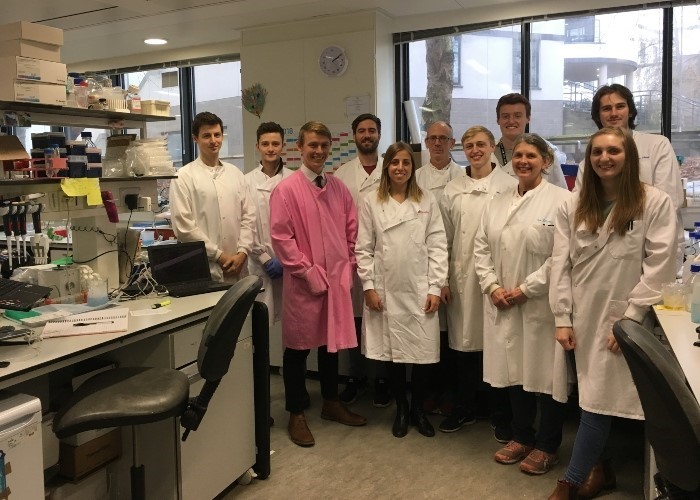More evidence is emerging that some types of bacteria can keep us healthy rather than make us ill, even when it comes to breast cancer.
We often think about bacteria giving us infections or evolving to become superbugs resistant to antibiotics. But bacteria play a much wider role in our health. More evidence is emerging that some types of bacteria can keep us healthy rather than make us ill, even when it comes to treating breast cancer.

Small, but not insignificant
There are between 300 and 1,000 different species of bacteria in our bodies, and different parts of the body have distinct types of bacteria. In recent years, rapidly developing research tools have been helping us take a closer look at these bacteria, and examine exactly how they affect us.
We've known for some time, for instance, that bacteria in our gut play an important role in digestion, but researchers are also starting to find links between gut bacteria and obesity.
In adults, the variety of gut bacteria is affected by environmental factors, long-term diet, stress and medicines.
There’s also an important relationship between our immune system and bacteria. The immune system needs to fight foreign bacteria but, at the same time, allow helpful microbes to survive. We’re beginning to understand how these bacteria can affect our immune system in lots of ways.
The link between gut bacteria and breast cancer
We’ve already linked changes in our gut bacteria to several different conditions and diseases, including cancer. However, we still don’t quite understand if these changes are a cause or a consequence.
The link between gut bacteria and cancer is complicated. Research carried out in mice shows that gut bacteria can protect from certain types of cancer, but increase the likelihood of others.
But researchers think that most gut bacteria aren’t simply good or bad: it’s our diets that change how they behave. Gut bacteria can process many things we eat. It’s thought that some of the resulting molecules may either protect against cancer or have the opposite effect.
There also seems to be a more direct link between gut bacteria and breast cancer. Having higher levels of the hormone oestrogen over a lifetime can increase a woman’s risk of developing breast cancer. We know that some types of gut bacteria can prevent some oestrogen from being removed from the body, potentially contributing to higher levels of this hormone.
Looking more closely at the relationship between gut bacteria and oestrogen, scientists observed that antibiotics and different diets could influence the levels of oestrogen in the blood. Further studies in mice and healthy postmenopausal women support the idea of a link between differences in oestrogen levels and the variation of gut bacteria.
It’s very hard to untangle whether gut bacteria play a significant role in breast cancer risk, and we hope that in the future scientists will be able to answer this question.
Can gut bacteria affect cancer treatment?
Recent studies using cells and animals suggest bacteria can change how well cancer treatments work. The relationship between gut bacteria and the immune system seems to play an extremely important role here.
Researchers have seen that gut bacteria may influence how well immunotherapy works. While not yet available to treat breast cancer outside clinical trials, we already use immunotherapy for other types of cancer. It relies on turning the immune system on to recognise and destroy cancer cells.
Furthermore, researchers noticed a significant difference in how well immunotherapies work from patient to patient. Recently, scientists studying melanoma in mice found that gut bacteria can influence responses to a specific type of immunotherapy, called immune checkpoint inhibitors.
They compared how well checkpoint inhibitors work to treat melanoma in mice with similar genetics, but brought up in different environments and carrying different gut bacteria. They noticed there were significant differences. Investigating further, the researchers showed that transferring gut bacteria from mice for which treatment worked better, to mice that weren’t benefiting from treatment as much, led to overall improvement. These interesting results will encourage more research in this field.
To untangle the relationship between antibiotics, gut bacteria and breast cancer, we’re funding Dr Stephen Robinson at the University of East Anglia. In his previous work, Stephen observed that antibiotics could speed the growth of primary tumours by disrupting the immune system. This disruption is likely because of the effect they have on gut bacteria. But antibiotics may also help to prevent breast cancer spreading, by making cancer cells less able to adapt to new locations. Stephen and his team are studying in more detail about how gut bacteria can affect breast cancer spreading.
This research could change how we use antibiotics. If using gut bacteria could turn the immune system against breast cancer, there could be an inexpensive way to help prevent breast cancer from spreading.
Using bacteria against cancer
Some researchers think designing drugs to target our gut bacteria could change cancer medicine. The drugs could stimulate our bacteria to help defend against cancer, or potentially block some of the severe side effects from treatments. New knowledge of how bacteria may affect cancer treatment could also lead to cocktails of microbes to boost the effectiveness of cancer therapies.
This field of research is fast evolving. We hope scientists will find ways to help our bacteria keep us healthy and improve how we understand and treat breast cancer.